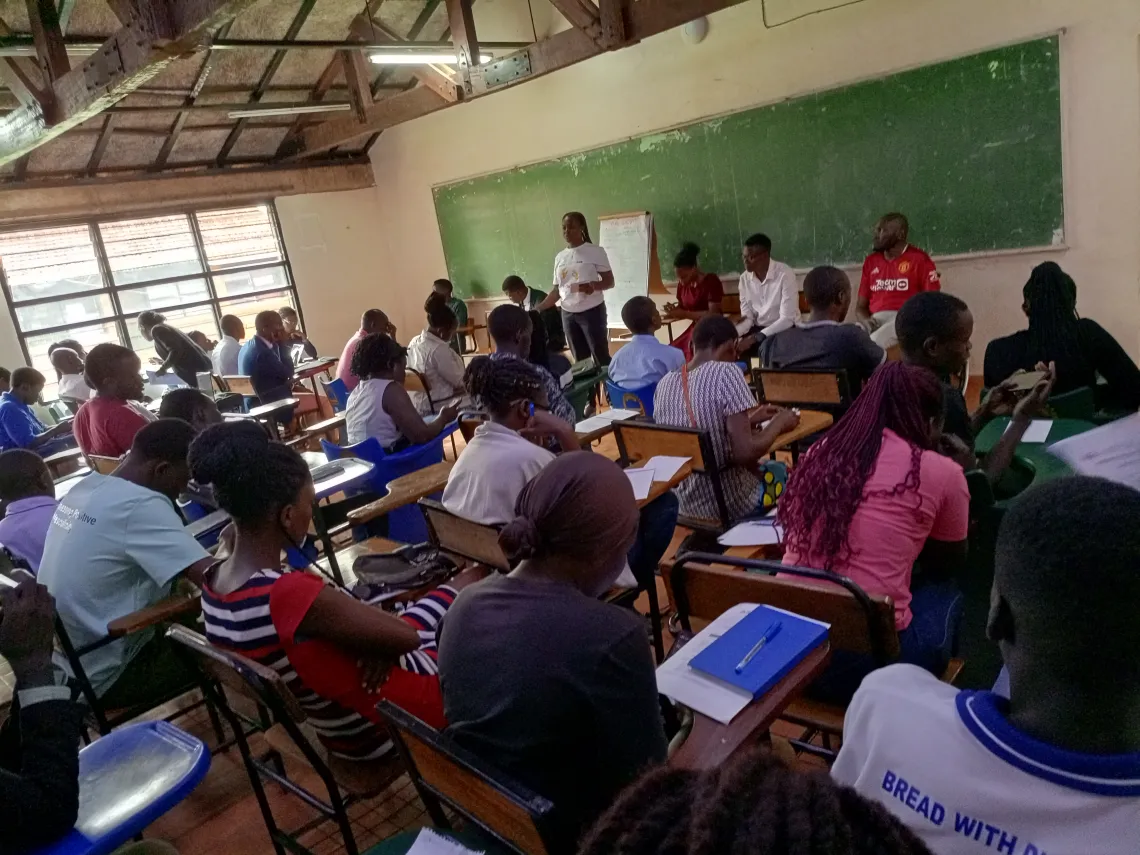Sonoran Center Fellow Launches Mentorship Program in Ugandan Universities, Empowers Students with Disabilities to Advocate for Themselves, and Influences Higher Education Policies

Denis Ouma, pictured wearing a red t-shirt and white trousers and sitting in a wheelchair, delivers remarks on why he established the mentorship program for students with disabilities during an induction ceremony held at Kyambogo University on September 7, 2024.
Sonoran Center for Excellence in Disabilities fellow Denis Ouma has launched a mentorship program for students with disabilities in Ugandan institutions of higher learning. Denis, who holds a Bachelor of Commerce degree from Makerere University, is currently pursuing a double master's in Disability Studies at Kyambogo University in Uganda and a master's in Corruption and Governance from Sussex University in the UK under the Chevening Scholarship. He was a Spring 2024 Professional Fellow, a program funded by the U.S. Department of State for emerging leaders in Africa and implemented by the Institute for Community Inclusion at the University of Massachusetts, Boston. This program allows fellows to exchange and implement best practices for inclusive civic engagement upon returning to their home countries. As part of his fellowship, Denis was hosted at the University of Arizona Sonoran Center for Excellence in Disabilities under the mentorship of Center director, Jacy Farkas.
Denis is a quadriplegic, a condition that affects the use of his hands and limbs due to an accident he sustained 16 years ago. He recalls facing rejections and frustrating questions while seeking admission to university to further his education.
“Many universities rejected me due to their perception that I was too disabled to attend school,” Denis remarked, adding, “At times, they asked how I could write, get myself to the lecture room, or even take exams.”
Denis remembers that, at times, he had no satisfactory answers to these questions; all he wanted was to be in school. He has since risen above these challenges to become a prominent advocate for disability rights in Uganda. Denis is a social entrepreneur who founded the Spinal Injury Support Society and the Coalition for the Rights of Persons with Disabilities Activism Uganda. In these roles, he advocates for the rights of individuals with disabilities and provides rehabilitation for spinal cord injury survivors. He also founded Embellish Consults Ltd, a corporate disability consultancy.
Denis believes that many students with disabilities still face similar challenges and often struggle to stand up for themselves. As a result, they are frequently weighed down by not knowing how to respond or advocate for their rights. By establishing this mentorship program, Denis aims to help these students navigate these barriers, empower them to voice their concerns as self-advocates, and support their success both during their education and after graduation.
Denis, in collaboration with the Sonoran Center and Kyambogo University in Uganda, aims to develop a cadre of mentors for disability inclusion in higher education. He also seeks to support universities in reviewing and adopting disability-friendly policies and best practices. The Sonoran Center has connections to professionals and resources that can assist in developing training content, designing curriculum modules, delivering virtual training sessions, and providing overall guidance and sharing of best practices. Kyambogo University has connections to the Ministry, central government, and policymakers who can facilitate changes in policies and accommodations for people with disabilities in higher education in Uganda. Denis’ network includes connections to Disabled People’s Organizations, self-advocates, and mentors who can inspire and empower students with disabilities.
This initiative will empower students with disabilities to build essential skills in entrepreneurship, finance, employability, Sexual and Reproductive Health and Rights (SRHR), mental health, and self-advocacy, as well as helping them develop positive beliefs and goals for the future.
On the 7th of September, the inaugural orientation seminar took place at Kyambogo University where 70 students with disabilities attended in person and others joined virtually, out of an expected number of 100 students. At this orientation, Dr. Paul delivered a keynote address on Awareness of life (experiences) for students with disability in higher education institutions in Uganda; a project overview presentation from Denis; motivational presentation from our partner and PFP alumni, Harunah Damba; presentation on sexual and reproductive health from Stella Akayo (Psychologist and social worker); and mental health presentation from Nelson Bugembe, who explored the unique challenges faced by students with disabilities, from navigating academic and social environment to the emotional and psychological pressures.
The following topics have been agreed upon to constitute the Handbook on Disability Mentorship for Ugandan Universities:
Leadership and ethics for disability inclusion in higher education
Advocacy and influencing for disability inclusion; provision of reasonable accommodations in higher education
Employment soft skills and career readiness
Disability Equity Training (DET) for university council committee on student welfare, 12 different faculty boards
Gender considerations in disability inclusion in higher education
Key disability legal and policy provisions on higher education and their implications for disability inclusion
Understanding of the concept disability as a social and a human rights issue and the implications in the higher education institutions.
At the end of the program, Denis aims to leave behind a self-sustaining mentor-mentee network that includes over 500 students with disabilities, 100 mentors, 50 faculty staff members, and representatives from university councils and boards. This network will be dedicated to fostering institutional and systemic change and institutionalizing disability mentorship in higher education in Uganda. Central to the program is the development of a comprehensive disability mentorship handbook. This handbook will guide the conduct of disability mentorship in higher education across Uganda.
Long-term outcomes may include measurable improvements in job prospects for graduates with disabilities. The program aims to increase post-graduation employment rates by 25% by providing targeted career development training and facilitating connections with disability-friendly employers.
